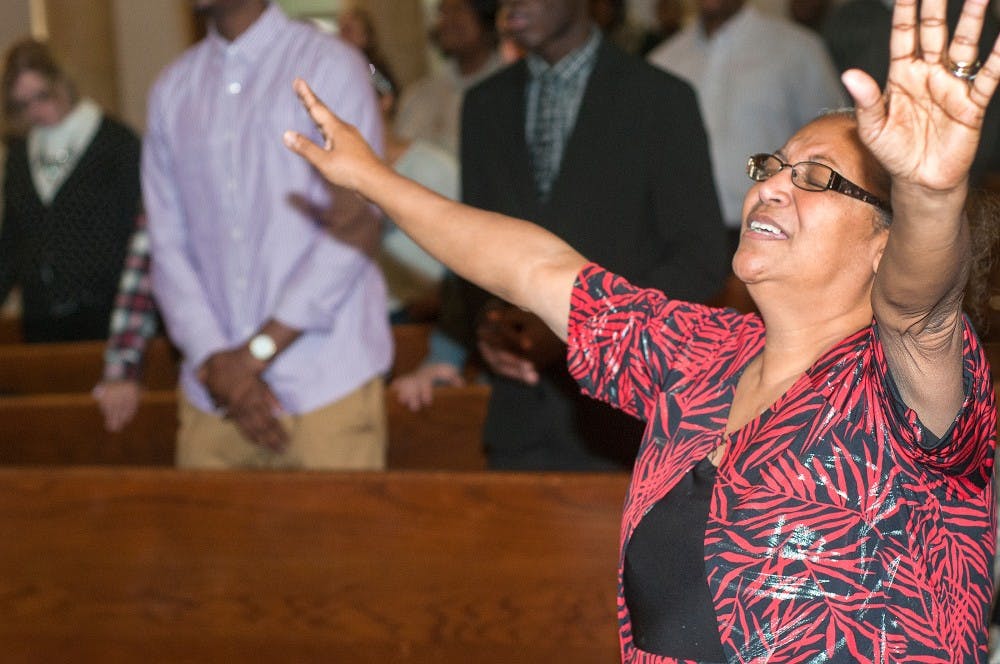When you walk into the Epicenter of Worship in Lansing’s Old Town , you’re immediately bombarded with enthusiastic greetings.
Every Sunday, the Epicenter of Worship is filled with students and Lansing residents. While the church is not packed to the brim, there is no shortage of people looking to fulfill their spiritual needs.
The difference between this church and one students might have easier access to is the “praise team” — a group equipped with an assortment of instruments ranging from electric guitars to drums to their own voices.
For English junior Leon Adams , finding a church that fit his spiritual needs on campus wasn’t difficult. A few weeks after joining the MSU Gospel Choir, Adams received fliers for multiple churches that were available to him in Lansing.
“I grew up in Detroit, and when I went to Epicenter for the first time, I noticed they had similar belief systems as the churches I usually went to,” Adams said. “So that’s what gravitated me toward that church.”
With high energy and a contemporary style of worship, EOW makes it easy for their diverse gathering to be able to experience the word of God fully.
Connection is essential for members of the EOW – whether it is connecting with God or others. Before the service begins, there is time set aside to participate in a “ministry of hugs” where visitors greet their neighbors.
While the EOW gives a more modern sermon, it is a hub for black students who grew up in traditional black churches.
These churches are known for a strong enthusiasm characterized by passionate lectures.
This spirituality is not something that vanishes in black students after moving away from home.
According to a sample survey held by the MSU Student Perceptions of Problems and Use of University Programs and Services, 85.8 percent of black students indicated that issues of spiritual and religious nature are important. Of the whole student body, 67.7 percent indicated it was still important.
“When you do surveys, generally speaking African Americans are people who score highest in terms of saying that issues of religion and spirituality are of interest to them,” said MSU psychology professor Lee June , who conducted the survey of 1, 200 students.
Strength of culture
June said importance of religion in black culture is the result of a challenging history.
June said that during the time of slavery and segregation, religion served as driving forces both in terms of personal survival and giving meaning to life.
In slavery times, black people formed their own churches to help them find hope in their oppression.
June said that continued forward because many of the prominent civil rights activists, such as Martin Luther King Jr., Jesse Jackson and Malcolm X, had deep rooted spiritual convictions.
“So it’s a historical factor that I think continued in many ways even to this present time,” June said. “So many of the students here whose parents came out of that religious tradition have passed it down to generations.”
Media and information senior Alex Whittaker grew up a Christian. Whittaker said he attended private Catholic schools in elementary, and went to church almost every Sunday because his parents did. He was influenced religiously by his parents, even when they divorced toward the end of his fifth grade year.
“Because of that, finances weren’t as strong so I went to public school,” Whittaker said. “My faith didn’t really change but I definitely had to rely more on the example my mom set in the house because my dad moved out.”
Watching his mother raising two sons as a single mom, Whittaker said it encouraged him and strengthened his faith.
“I just learned that life isn’t always going to be pleasant, but my mom always taught me that through these hard circumstances, God is who we want to serve and who we want to please.” Whittaker said.
Finding faith
Many of the churches located in a walking or short biking distance of campus can be considered “white-washed.”
Going to churches alone can be intimidating, especially when students are used to going to churches where they know or are familiar with almost everyone who attends.
Rachel Love, creative advertising senior and vice president of The Impact Movement , said that’s the reason why her organization exists — to help build a community.
The Impact Movement is a Christian organization that aims to reach black students. Their focus is on three things — being financially, responsibly and morally fit.
Love said those three aspects are particularly stressed because those are the areas in which young black students in the community are believed to struggle with the most.
Impact holds three small Bible study sessions once a week, and a large Bible study activity every other week.
Love said the organization is not a substitute for church for students, so they encourage students to attend church.
“The reason I used to not go to church freshman year was because I didn’t have anyone to go with,” said Love, adding the group all goes to the Epicenter of Worship together. “If we all go together then it’s more encouraging to go. Then we do dinner after church on Sundays.”
Human development and family studies junior Cayla Warren joined The Impact Movement last year. Before she joined, she said didn’t take her relationship with God seriously.
“I believed in God and I considered myself a good enough Christian,” Warren said. “Yet, I didn’t have a personal connection or relationship with God.”
Warren said that since joining Impact, she has dealt with several aspects of her life that have always been struggles for her. Most importantly, Warren said Impact taught her so much about the love of God, which is now reflected in her accepting and loving herself for who she is.
“Impact taught me the importance of holding myself accountable whether it be through my actions or words,” Warren said. “I know what unconditional love truly, really means. I seriously wouldn’t have been where I am today without Impact.”
Connecting through music
The MSU Gospel Choir is a Christian organization that has been around for over 40 years . It started off with three people who had one vision – to sing.
Today, the group has evolved into a passionate group of 40 students and has a reputation for sharing the word of God and leaving an emotional impact on audience members.
But when mechanical engineering senior Alexander Hoover initially joined the choir, it was different than what he expected it would be.
“As time kept going on, my passion kept growing for the ministry because I saw what we were doing – it was bigger than ourselves,” Hoover said. “We all had an agenda that didn’t include ‘what can we get out of this.’ It was ‘what can we do for others.’”
Hoover said the MSU Gospel Choir is not just a registered organization, it can be considered a home away from home. The choir also strives to be a family.
“Just as your family members will tell you ‘If you need anything call me,’ we do the same thing,” Hoover said. “We tell our members all the time we’re a nonprofit organization, but at the same time we give regardless of what we have.”
Adams, who is also an adviser for the MSU Gospel Choir, said people usually stick with being a part of the choir because of the openness and passion that is demonstrated during rehearsals.
Toward the end of rehearsal, a few advisers or members share how the word of God has impacted them in a personal way.
“It’s way more passionate (than other choirs),” Adams said. “Those type of things really help people coming into choir or into college as a new person because it displays the familiarity of your church at home but also challenges (you) to get closer to God.”





